News from Maison de la Gare
Angels of Saint Louis
Tweeter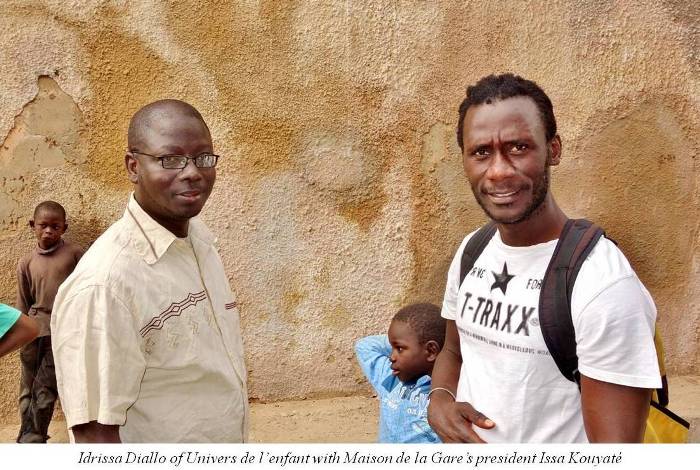
Karen and Sonia describe their experience on a "Ronde de nuit"
In late March, a group of
six Canadian volunteers participated in a ronde de nuit (night round) led
by Maison de la Gare's partner Idrissa Diallo of Univers de l'enfant. The
group consisted of three parents and their teenage daughters.
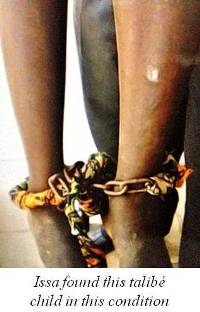
Sonia recounts: "I didn't participate in my first ronde de nuit until
a few years ago. In fact, I had been completely unaware of this other side
of Issa Kouyaté's life, although I did know that talibés sometimes run from
their daaras and marabouts. The boys can risk severe beatings when they
fail to deliver their begging quotas. Sometimes they prefer to run rather
than return to an abusive marabout and suffer the consequences of an unfilled
quota. Sometimes, the conditions at the daaras are so bad that children run
when they cannot bear it any more.
As hard as Issa works by day, for years he has gone out on the streets late
at night on weekends or whenever he hears word of the location of a runaway,
to search for and rescue runaway talibés. No one pays Issa to do this work.
When he found children on the streets at night in the past, he took them
back to his own apartment and settled them in for the night. . He could
have 4 to 10 children  staying in his living room at any one time. He cared
for them, fed them, and spent as much time as he could with the often
severely traumatized boys.
staying in his living room at any one time. He cared
for them, fed them, and spent as much time as he could with the often
severely traumatized boys.
Since the emergency shelter was built in Maison de la Gare's center in 2014,
the runaways have been staying there for a few days or weeks under the care
of "house mother" Mame Diarra, a petite long-term volunteer from France.
Every now and then a child who has suffered severe abuse and has no home to
go to settles in for a longer stay. Recently, a grant from the European
Union has enabled a Maison de la Gare team led by Idrissa to be dedicated to
finding runaways, taking them into care and, where appropriate, repatriating
them to their homes. Issa's own home is once again his own, most of the time."
Karen continues: "The second to last evening before we left Saint Louis,
we met Idrissa, Bathe and Abdoulaye at 11 p.m. at Place Faidherbe in the
center of town, 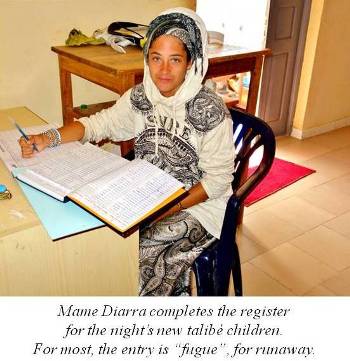 armed with flashlights. The streets of Saint Louis are a
different place at night. Quiet, not as inviting. It was a brisk night;
the temperature hovered in the high teens but the soft blowing wind made the
air temperature feel much cooler. We all wore jackets. I can't imagine what
the cooler temperature would be like for boys forced to sleep outside.
armed with flashlights. The streets of Saint Louis are a
different place at night. Quiet, not as inviting. It was a brisk night;
the temperature hovered in the high teens but the soft blowing wind made the
air temperature feel much cooler. We all wore jackets. I can't imagine what
the cooler temperature would be like for boys forced to sleep outside.
As a group we headed over the bridge toward the Guet Ndar fishing village on
the Langue de Barbarie, a world unto its own with a highly concentrated
population. Fishing boats litter the shoreline. Dilapidated vendor stalls,
make-shift shacks and garbage strewn everywhere give the impression of
poverty, but a closer look beyond the squalor reveals a prosperous community
with multiple television sets, expensive fishing boats and huge families.
Needless to say, there are lots of nooks and crannies where runaway talibés
can find refuge. We shone the beams of our flashlights into boats, street
corners and parked cars in search of boys sleeping.
Idrissa stopped at a food stall to ask a woman if she had seen or heard
reports of any runaway talibés. She had not, so we continued our search,
walking the streets. There was a surprising amount of activity on the street
at that hour. We continued our walk along the shoreline and then snaked our
way back into a more residential area.
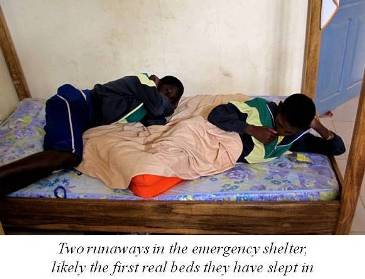
Less than 50 meters from the food stall, we discovered three boys nestled
behind a knee-high wall. The boys were sleeping on piles of rags, huddled
together. They were quite startled, but the Maison de la Gare staff members
spoke quietly with them, asking what daara they were from and why they were
sleeping on the street. After a few minutes of questioning with few answers,
the staff told them about the emergency shelter at the center and explained
that they would be taken there. Suddenly one of the boys broke and ran, too
quick to be caught. Idrissa summoned a taxi and Bathe seated the two boys
in the back seat with Abdoulaye on one side and one of us on the other side.
The boys names were Mamadou and Seydou.
We arrived at the center a bit after midnight. Mame Diarra appeared
completely at ease in this situation. She communicated fluently with the
boys in Wolof, and then left the room to fetch sweatshirts for them. Then
she sat down 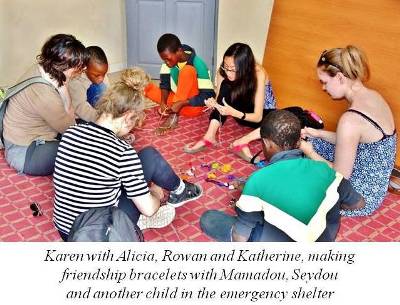 to ask the boys questions and to fill out the intake forms for
each of them. The boys seemed quite reticent, although I think they were
somewhat comforted by the fact that Mame Diarra is a woman; most talibés
haven't had any motherly attention in years. We left the boys with her to
resume our ronde de nuit."
to ask the boys questions and to fill out the intake forms for
each of them. The boys seemed quite reticent, although I think they were
somewhat comforted by the fact that Mame Diarra is a woman; most talibés
haven't had any motherly attention in years. We left the boys with her to
resume our ronde de nuit."
Sonia reflects on the experience: "While on the run, the children are
vulnerable. I have come to understand more of why Issa and Idrissa are so
driven to do this work in their own 'free' time. The children flee for
fear of the life in the daaras. But, what waits for them on the street
could be even worse. Sexual assault is common against talibé boys on the
streets, late at night as society sleeps. No one will be asking about them
or care much for their wellbeing. Easy marks! I knew this terrible fact;
I had seen the results of such trauma with my own eyes. On my first ronde
de nuit we had found a boy, six-year old Gora, who had been sexually
assaulted on the 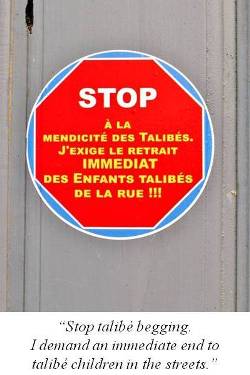 streets the previous night. My daughter and I are
haunted by thoughts of him still. But this night, Idrissa warned me of a
greater risk. He told me that he and many others believe that children
have been disappearing more often than in the past. He thinks because
there are more talibés, and thus more runaways, the opportunity for
abduction is increasing (it is estimated there are over 10,000 begging
talibé children in Saint Louis). The children themselves would certainly
be fearful of these dangers, which underscores just how bad their
circumstances must be for them to prefer the risks of the streets to
those of the daara.
streets the previous night. My daughter and I are
haunted by thoughts of him still. But this night, Idrissa warned me of a
greater risk. He told me that he and many others believe that children
have been disappearing more often than in the past. He thinks because
there are more talibés, and thus more runaways, the opportunity for
abduction is increasing (it is estimated there are over 10,000 begging
talibé children in Saint Louis). The children themselves would certainly
be fearful of these dangers, which underscores just how bad their
circumstances must be for them to prefer the risks of the streets to
those of the daara.
Idrissa says that, on the nights when he is not on a ronde de nuit, he
cannot sleep as he imagines the dangers lying in wait for the children
he will not pick up that night. Issa feels the same way. This is the
reason Issa and Idrissa value sleep so little."
Issa and Idrissa are truly the "angels of Saint Louis."







